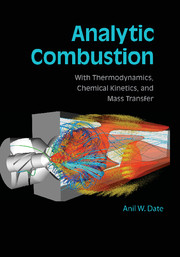Book contents
- Frontmatter
- Contents
- Preface
- Symbols and Acronyms
- 1 Introduction
- 2 Thermodynamics of a Pure Substance
- 3 Thermodynamics of Gaseous Mixtures
- 4 Chemical Equilibrium
- 5 Chemical Kinetics
- 6 Derivation of Transport Equations
- 7 Thermochemical Reactors
- 8 Premixed Flames
- 9 Diffusion Flames
- 10 Combustion of Particles and Droplets
- 11 Combustion Applications
- APPENDIX A Thermochemistry Data
- APPENDIX B Curve-Fit Coefficients for Δhc, Tad, Kp, Cp, h, and s
- APPENDIX C Properties of Fuels
- APPENDIX D Thermophysical and Transport Properties of Gases
- APPENDIX E Atmospheric Data
- APPENDIX F Binary Diffusion Coefficients at 1 atm and T = 300K
- Bibliography
- Index
1 - Introduction
- Frontmatter
- Contents
- Preface
- Symbols and Acronyms
- 1 Introduction
- 2 Thermodynamics of a Pure Substance
- 3 Thermodynamics of Gaseous Mixtures
- 4 Chemical Equilibrium
- 5 Chemical Kinetics
- 6 Derivation of Transport Equations
- 7 Thermochemical Reactors
- 8 Premixed Flames
- 9 Diffusion Flames
- 10 Combustion of Particles and Droplets
- 11 Combustion Applications
- APPENDIX A Thermochemistry Data
- APPENDIX B Curve-Fit Coefficients for Δhc, Tad, Kp, Cp, h, and s
- APPENDIX C Properties of Fuels
- APPENDIX D Thermophysical and Transport Properties of Gases
- APPENDIX E Atmospheric Data
- APPENDIX F Binary Diffusion Coefficients at 1 atm and T = 300K
- Bibliography
- Index
Summary
Importance of Thermodynamics
Ever since humans learned to harness power from sources other than what their own muscles could provide, several important changes have occurred in the way in which societies are able to conduct civilized life. Modern agriculture and urban life are almost totally dependent on people's ability to control natural forces that are far greater than their muscles could exert. We can almost say that one of the main propellants of modern society is the increased availability of nonmuscle energy.
Pumping water to irrigate land and supply water to towns and cities; excavation of ores, oil, and coal, and their transport and processing; and transport of grains, foods, and building materials as well as passengers on land, water, and in the air are tasks that are exclusively amenable to nonmuscular energy. In fact, the extent of goods and services available to a society (measured in gross domestic product, GDP) are almost directly related to the per capita energy consumption. This is shown in Figure 1.1 for the years 1997 and 2004. The figure also shows that over these seven years, the GDP of all countries increased, but the developed countries achieved reduced per capita energy consumption through technological improvements, compared with the developing countries.
- Type
- Chapter
- Information
- Analytic CombustionWith Thermodynamics, Chemical Kinetics and Mass Transfer, pp. 1 - 11Publisher: Cambridge University PressPrint publication year: 2011



